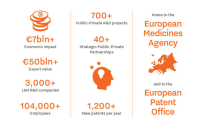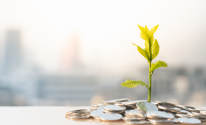
Chapter 2
Stimulating Internationalization
For Economic and Societal Impact
The Netherlands’ unique DNA and collaborative mindset actively stimulate novel ideas and smart innovations. By maintaining a nurturing environment for forward-thinking companies, the Netherlands stays competitive on the world stage and supports innovation and sustainable investments. Part of this nurturing environment includes the National Growth Fund (NGF). With a budget of 20 billion euros, this fund invests in projects that stimulate economic growth in the long term.
Arthur Mirzoian, policy advisor Life Sciences and Health (LSH) at the NGF, tells us more about the impetus NGF provides to the Dutch economy in the long run, and especially the focus
on the investment that allows projects to be drawn internationally.
So why and when is it relevant for public and private partners to seek an NGF investment?
'It starts with a good idea to strengthen the Dutch sustainable earning capacity and simultaneously tackle societal challenges and accelerate transitions. These ideas typically have a proven market interest but lack a short-term and concise return of investment perspective. This ‘inevitable loss’ often results in an innovation lag. If parties believe they can break through this lag by means of a solid consortium and a substantial impulse funding of more than 30 million euros, then it is relevant to submit a proposal.'

We are now heading to the fourth round. What is going to change?
'Yes, we are in the process of setting up the fourth investment round. Starting on October 12, a quick scan will once again be available for submitters to get feedback on the project idea. It is important to take advantage of this to avoid developing a proposal which is deemed to fail. In addition, from February 1st, 2024, this round will be subject to a mandatory pre-notification on the basis of which submitters can test an already developed proposal and receive feedback. Our advice is to keep an eye on the Netherlands Enterprise Agency (RVO) website. Another larger adjustment is that grant applications can be submitted on a continuous basis from June 1st, 2024 onwards. Ministerial proposals have two deadlines: September 6, 2024 and March 14, 2025. The Advisory Committee will assemble in October 2024 and March 2025. More information on the RVO and NGF websites.'
What makes the NGF different from other subsidies?
'Several factors make the NGF a unique instrument. The budget (€20 billion) and the focus on the full technology readiness level spectrum (TRL 1-9) are important. This creates opportunities for financing large-scale projects and programs which are being reviewed by a well-positioned and independent advisory committee. In addition, we offer the possibility for a blended finance in departmental proposals (a mixed grant/investment construction). Finally, a lot of money is involved. Therefore the assessment is strict and we carefully monitor the spending and impact.'
Why is the international component important in NGF projects?
'The importance lies in realizing Dutch innovations being embraced internationally and assuring available international knowledge, infrastructure, experience and human capital is fully utilized. The complex chains and limited own resources force us to seek cooperation.'
'A strong international component is beneficial for this very cooperation while providing a multiplier effect for earning capacity. In the Final Report on round 3 as well as in the Internationalization Guide a further elaboration is provided on this topic.'

The Final Report on round 3 mentions the poorly developed international component of proposals. Can you tell us more about these deficiencies?
'Yes, that was one of the conclusions, albeit that we saw a huge difference between proposals. For example, we sometimes saw foreign parties or available technology that headstarted a certain topic but were not engaged or consulted at all. Another example is proposals that failed to make sufficient work of gathering international private capital. We have written a guide for the fourth round, and in the autumn, there will be a webinar on internationalization. We hope that these efforts will enable applicants to better develop the international component of their proposals.'
How is internationalization already playing a role in various projects and which LSH NGF project stands out in this regard?
'That’s a good question because we encourage projects to learn from each other. A fine example within LSH is RegMedXB (collaboration with Belgium and increasingly with Japan). Other proposals that should be mentioned are QuantumDelta (collaboration between the Netherlands, France and Germany) and Aviation in Transition (connection to large EU projects).'
Where can parties go for questions about internationalization and which partners can contribute to this when writing an NGF proposal?
'I would say consult the handbook, attend webinars and don’t hesitate to contact us. Additionally, the government has set up many public “counters” where an applicant can turn to. In the private sector, many parties like industry associations and consultants are also ready to think with applicants and provide advice.'
Are you interested in exploring the possibilities of submitting a proposal in the next round of the National Growth Fund? The event on October 12, 2023 and the various publications will get you off to a good start.

HHINT Kickstarter Call
The Dutch have a long-standing tradition of investing in international cooperation. Investing in an international network can provide a significant acceleration of research and development (R&D). Sharing knowledge between international partners aids in identifying end users and supports valorization and export. In addition, international cooperation may be the first step for foreign organizations to invest and settle in the Netherlands.
Therefore, Top Sector LSH aims to encourage international, public-private partnerships (PPP). Current financial instruments for early partnerships between the Netherlands and non-European countries are limited. To promote R&D cooperation worldwide, the Top Sector LSH has established the program ‘Health~Holland International (HHINT) Kickstarter for public-private partnership’.
Besides the HHINT Kickstarter, Health~Holland offers together with its partners diverse ways to support Dutch and foreign companies in their internationalization process. Our Start-up and SME-page will give you an overview in a glance!
Health Solutions Globaliser
Recently, the fifth Health Solutions Globaliser started! In this 12-week program participants are being supported with a structured approach to prioritise which opportunities (not) to chase and how to successfully enter a new market abroad. This programme is supported by Health~Holland. Keep an eye on the website if you want to be present at the sixth Health Solutions Globaliser!
Promising Organ-on-a-Chip technology
The Netherlands is leading the way when it comes to the Organ-on-a-Chip technology. We have an extensive ecosystem of academic research, united in the Public-Private Partnership hDMT among others, and a number of companies at the forefront of this market.
In addition, this year the Dutch Research Council (NWO) invested about 22.7 million euros in seven projects for innovative scientific infrastructure. For the University of Twente over 3 million euros will go to the Organ-on-Chip Development Center (hDMT INFRA OoCDev).
Currently a pilot project initiated by the Ministery of Economic Affairs and & Climate policy on Organ-on-a-Chip technology is being prepared. Through this project, the Netherlands' driving role in the Organ-on-a-Chip market will be further strengthened, with the aim of accelerating medical innovations worldwide in the field of personalised medicine.

Dementia Proposition
In the coming years, the number of people with dementia will grow significantly. The impact on the person, loved ones and care is serious. Hard work is being done to develop and validate therapies for dementia, but it takes time. Yet, much can already be done in a national and international context.
People with dementia are often still able to participate in society for a long time in a living environment that supports and encourages them to do so. This promotes the health and quality of life of people with dementia and can even slow down the worsening of symptoms to some extent. Innovations developed in this context may also relieve the pressure on informal caregivers and care professionals and promote their cooperation (Mission IV).
Currently, the Top Sector LSH together with a broad range of public and private partners active in the field is working on an international dementia proposition. With this proposition, we want to raise a joint and organised conversation with the field; researchers, entrepreneurs, health & care givers, executives, policymakers and citizens on how we can accelerate innovation in the Netherlands, and to identify what knowledge is there to share and how to gain from these across borders.
Tackling dementia
We are committed to collaboration on innovative technology and therapy and the development of concerted approaches to tackle dementia. In all these efforts, we are mindful of the tight labor market for care professionals and how we can use technology to contribute to solutions that may also help informal caregivers in their mostly rather demanding daily activities

Upcoming Mission
From October 23-27, a group of Dutch delegates will be visiting China, together with the Minister for Long-term Care, Conny Helder. The aim of this visit is to get a clear picture of how people in China are coping with the needed transformation and implementation of innovation when it comes to elderly care and specifically dementia. China will have to make this transformation on a much larger scale and besides they will be facing the challenges of their former ‘one child policy’, a combination which will give us the opportunity to exchange best practices; in the field of research or deploying fieldlabs to identify effectiveness of technologies.
Keep an eye on the Health~Holland website for more information about upcoming missions.







